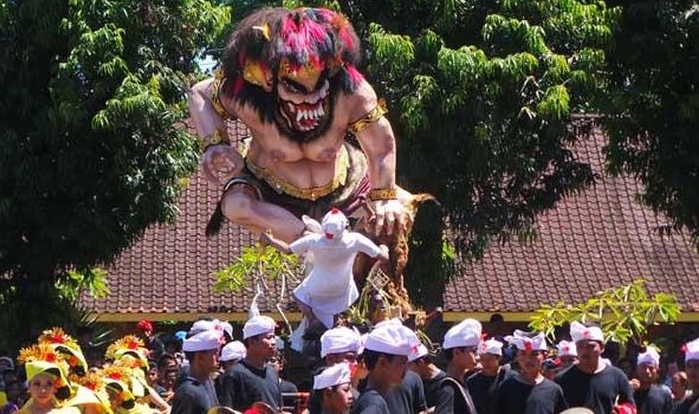Nyepi the day of silent can be interpreted as a day of purification for humans and nature. Nyepi Day is a celebration of the Saka new year in the Balinese Saka calendar. Through Nyepi, Hindus, especially Balinese people, hold a series of traditional ceremonies. Nyepi is also a crucial part for Hindus to welcome the Saka New Year.
During the Balinese Nyepi, Hindus in Bali try to resist the urge not to leave the house, working, start a fire, or making noises. This self-control is carried out with Catur Brata Penyepian, or the 4 fundamental prohibitions of Amati Karya (no work), Amati Geni (no fire, no light and no electricity), Amati Lelungan (no travelling), Amati Lelanguan (no entertainment). By doing those, Hindus can be calmer when doing self-evaluation, meditation, and contemplating in silence.

The stages of implementing Nyepi Day have their respective meanings. Starting from the Melasti ceremony, Mecaru, Pengrupukan, Nyepi to Ngembak Geni. The ceremony is carried out with a special ritual. The first ceremony that must be carried out is the Melasti ceremony. The Melasti ceremony is held before Nyepi Day arrives. All prayer equipments in the temple is purified in the sea or river. For Hindus, the sea is believed to be the source of the holy water of life. Melasti or melasti means to wash away the impurities of nature with the water of life. Then, it is continued with the Tawur or Mecaru ceremony. This ceremony is a purification, eradicating all impurities, which is carried out in every house, village and other area.
Next is the Pengrupukan ceremony. This ceremony means expelling evil spirits from the houses’ yard and the surrounding environment. This ceremony conducted with ritual offerings and prayers as well.
Nyepi Day can be interpreted as a day of purification for humans and nature. In other words, Nyepi aims to get rid of past dirt and ugliness in order to be ready to face obstacles in the upcoming new year. During Nyepi, various activities are prohibited. With a quiet atmosphere, Hindus can do solemn contemplation.

The final stage of Nyepi Day can be interpreted as a place of recognition and forgiveness (Ngembak Geni). That is, as humans should admit mistakes and ask or forgive others. After Nyepi, Hindus usually visit each other's relatives and carry out the tradition of forgiving each other.
The celebration of Nyepi provides an understanding of the importance of tolerance in human life. Doing self-reflection at home is one of the processes to get ready to live in the new year.
The Nyepi Silent Day celebration makes Bali as the only island in the world capable of resting the whole island from various activities in 24 hours.


